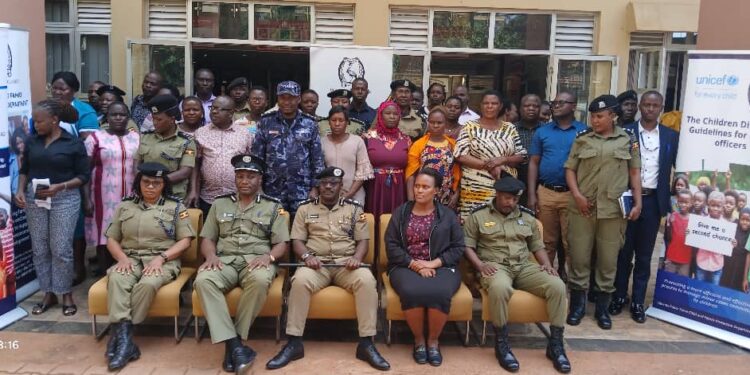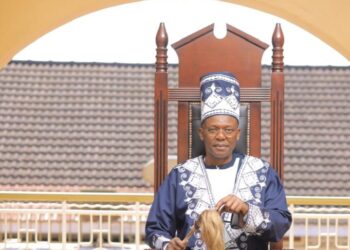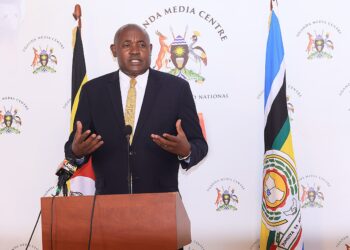In a move reminiscent of Jesus’ Great Commission (Matthew 28:18-20, Mark 16:15-18) the Uganda Police Force has dispatched a team of 40 police personnel who will act as ‘disciples’ to spread awareness about children’s safety and rights.
This launch follows a two-day training at the Civil Service College in Jinja City, where personnel attached to the Family and Child Protection Unit (FCPU) and the Criminal Investigation Department (CID) were equipped with knowledge and skills to protect Uganda’s most vulnerable citizens.
The rigorous training was organized by SSP Jane Nakityo, the Commissioner in charge of Formal Education and sponsored by UNICEF Kampala office, focused on the application of children diversion guidelines and data collection tools.
The Assistant Inspector General of Police (AIGP) Bamunoba Ubaldo who is also the Chief Political Commissar, who officiated at the closing ceremony expressed his conviction that the training will greatly improve the way child offenders are handled.
In a lively address punctuated with humorous philosophical quotes, the number 3 in the UPF emphasized that globally, juveniles who get in conflict with the law are treated differently from adults who commit offences
“…with the tools, knowledge, and skills in your hands, I now borrow Jesus’ words to say Go Out and protect the children of Uganda and make them be useful and responsible citizens…”, Bamunoba commissioned.
Known for being media-friendly, Bamunoba expressed his gratitude to the press for highlighting issues of public interest.
He acknowledged that the police often rely on media reports to follow up on cases and arrest suspects.
He made a passionate appeal to journalists to showcase the numerous positive achievements of the Uganda Police Force rather than focusing solely on negative aspects.
He cited a recent heartwarming incident where a traffic officer Abdallah Tumusiime was filmed braving the rain to guide motorists in Kampala City.
Such acts of heroism and sacrifice, he emphasized, deserved recognition and should not be overshadowed by reports of teargas and crowd control.
Participants enthusiastically welcomed the idea of balanced reporting, acknowledging that the time has come to move away from sensationalism and instead focus on presenting a more nuanced and accurate representation of events.
The participants concurred that the days of prioritizing sensational and negative stories over positive and uplifting ones are behind us.
The widely held old adage “when a dog bites a man, it’s not news, but when a man bites a dog, then it hits the headlines” was cited by the Kiira Regional Police Spokesperson SP James Mubi as an example of the kind of sensationalist approach that is no longer desirable.
“…instead, let’s advocate for a more thoughtful and responsible approach to journalism, one that prioritizes accuracy, fairness, and balance embedded in patriotism…”, Mubi who also attended the training stressed.
The Deputy RPC David Katunda who represented his immediate boss Charles Nsaba also endorsed Bamunoba’s call saying by embracing balanced reporting, the media can play a more constructive role in shaping public discourse and promoting a more informed and engaged citizenry.
Bamunoba’s appeal is being seen as a step in the right direction, encouraging a more balanced representation of the Uganda Police Force’s efforts.
The Uganda Police Force, like police forces around the world, plays a vital role as a frontline force. They are the first point of contact between the community and the government, dealing with a wide range of issues on a daily basis, which makes them easy victims of bad publicity.
By highlighting the positive achievements of the police, the media can help to foster a more informed and supportive public.
Children diversion is a process where children who have committed minor offences are diverted away from the formal justice system and instead provided with alternative interventions.
The objectives of children diversion include reducing the number of children in conflict with the law, providing alternative interventions that address the underlying causes of offending behavior, and reducing recidivism rates among child offenders, among others.
The data collection tools used in children diversion include diversion forms, which are used to record information about the child, the offence, and the diversion decision.
Other tools are assessment tools: used to assess the child’s needs and risk factors
Monitoring and evaluation tools that are used to track the child’s progress and the effectiveness of the diversion program
According to the Uganda Police Force, there were over 10,000 child offenders in Uganda in 2022.
The majority of these children were between the ages of 14 and 17 and were arrested for minor offences such as theft, vandalism, and assault.
Many of these children are vulnerable and come from disadvantaged backgrounds and are often forced to live on the streets or engage in child labour.
The current state of children offenders in Uganda is a major concern, with many children being detained in adult prisons and facing harsh treatment.
The Uganda Police Force has acknowledged that the current system is not effective in rehabilitating child offenders and has committed to implementing alternative approaches such as children diversion.
UNICEF, represented by Ms. Deborah Gasana pledged to provide more support to the Uganda Police Force in terms of computers and iPads to facilitate online reporting.
This move aims to replace the archaic system of capturing data and information on paper, which is laborious, prone to inaccuracies, and risks getting lost or defaced.
The announcement of more support from UNICEF was met with thunderous applause and cheers of “asante sana, yongeza tenna” (thank you very much, again and again) from the visibly joyous participants.
This outpouring of gratitude is a testament to the significant impact that UNICEF’s support will have on the lives of these individuals, most of whom have limited access to technology beyond their worn-out smartphones.
The participants’ excitement is palpable, and it’s clear that they recognize the potential of this support to transform their communities. With UNICEF’s assistance, they will be better equipped to address the complex issues affecting their children, including online sexual abuse and child trafficking ².
As UNICEF continues to work closely with the Uganda Police Force and other stakeholders, the impact of their support will undoubtedly be felt across the country.
The enthusiasm and appreciation of the participants are a heartening reminder that, together, we can create a brighter, safer future for all children in Uganda.
However, lower-cadre police personnel raised concerns about the lack of facilitation, which has led many personnel to leave the FCPU for the CID.
AIGP Ubaldo acknowledged these concerns and encouraged the personnel to remain committed to their duties.
As the Uganda Police Force takes this major step in protecting children’s rights, it is clear that there is still much work to be done.
With the support of UNICEF and the commitment of the police personnel, Uganda can create a safer, more compassionate society for all its citizens, especially its most vulnerable children.
Earlier on Bamunoba, Ubaldo was clearly thrilled to receive a professional baraka guard of honour, a ceremonial tradition that showcases respect and admiration for senior officers.
As he inspected the guard, Bamunoba took the opportunity to engage with the smartly dressed, youthful police personnel, speaking with them in a low tone that conveyed a sense of camaraderie and shared purpose.
What Is Baraka Guard?
A Baraka Guard, also known as a “Guard of Honour” or “Baraka Parade,” is a ceremonial tradition in some African countries, including Uganda.
During a Baraka Guard, a group of smartly dressed police or military personnel, usually in their finest uniforms, form a ceremonial guard to honour a visiting dignitary, senior officer, or other esteemed guest.
The ceremony typically involves a series of choreographed movements, including: forming a guard of honour, presenting arms (rifles or other ceremonial weapons), marching and counter-marching, plus saluting the guest of honor.
The Baraka Guard is a symbol of respect, discipline, and professionalism and is often performed during official visits, inspections, and other ceremonial events.
What is in A Name?
Like classical playwright William Shakespeare’s famous phrase, “what’s in a name? That which we call a rose by any other name would smell as sweet”-Romeo and Juliet Act 2, Scene 2),many have been asking what Ubaldo means.
The name Ubaldo is of the Italian and Germanic words ‘ubal’meaning noble or bright and wald meaning power or rule.
According to very trusted sources, Banoba’s parents baptized him Ubaldo after a Roman Catholic priest who served in their local mission.
Do you have a story in your community or an opinion to share with us: Email us at editorial@watchdoguganda.com













